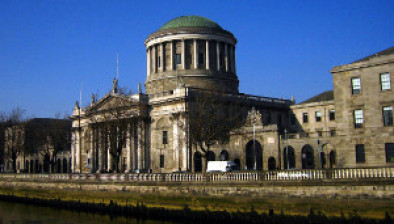High Court: Injunction to halt migrant housing plans on Crown Paints site refused

The High Court has rejected an application for interlocutory reliefs preventing the development of the former Crown Paints site at Coolock, Co Dublin for use as accommodation for international protection applications and for use as an IPAS Accommodation Centre.

About this case:
- Citation:[2024] IEHC 607
- Judgment:
- Court:High Court
- Judge:Mr Justice David Holland
Delivering judgment for the High Court in October, Mr Justice David Holland opined that the plaintiffs, by their pleas and averments, “disclosed that they have taken an early step, but clearly a step, down a road which leads to racist xenophobia, discrimination and, history teaches us, not infrequently far worse”.
Background
The third defendant, Townbe UC, the leasehold owner of the former Crown Paints site in Coolock, Co Dublin, intended to develop the site for use as accommodation for international protection applicants by erecting 230 prefabricated units to house 741 persons and as an International Protection Accommodation Service (IPAS) accommodation centre.
In April 2024, Townbe’s planning consultants notified Dublin City Council (DCC) of its intent to proceed with a change of use of the site without planning permission on the basis that this was exempted under Schedule 2, Part 1, Class 20F of the Planning and Development Regulations 2001.
Townbe claimed that its attempts to develop the site were frustrated in mid-July 2024 by public disorder, arson and criminal damage, and that it would not resume its plans unless and until it was safe to do so.
The plaintiffs sought reliefs inter alia preventing the defendants (including Townbe) from housing international protection applicants at the site, and compelling them to adhere to the precautionary principle in accordance with Article 191.2 of the Treaty on the Functioning of the European Union (TFEU) and obligations as to public participation in environmental processes for which the Aarhus Convention applies.
The High Court
Mr Justice Holland noted the court did not need to decide whether the proposed development would fall within the exemption under Class 20F, nor whether DCC was correct to reject a complaint from a member of the public of an unauthorised development on the site by reference to Class 20F.
Proceeding to examine the first question of a fair issue to be tried, the court considered that Article 191.2 TFEU is an interpretative principle applying to formal legal instruments which does not have direct effect in Irish law, and that the “aim” of “a high level of protection” of the environment is not actionable before the Irish courts.
Turning to the plaintiffs’ argument in respect of the Aarhus Convention, Mr Justice Holland recognised that this international law instrument also has no direct effect in Ireland and is not directly justiciable in the Irish courts by virtue of Article 29.6 of the Constitution.
The judge noted that the right to public participation was not free-standing and that the only arguably relevant decision-making process in which the question of public participation could arise was Townbe’s notification to DCC of its intention to develop in reliance on Class 20F, which he reiterated was “merely a notification obligation”.
Accordingly, the High Court determined that both of the legal bases on which the plaintiffs’ reliefs were sought were unstateable.
Proceeding to evaluate the plaintiffs’ factual pleas and averments, Mr Justice Holland noted that certain of the pleas upon which the plaintiffs’ claims for relief were unsupported by evidence but required consideration in context as they were made in support of the application.
The court set out a list of these pleas, which included themes such as the already-existing homelessness crisis, the facilitation of the entry of “unvetted” migrants into the State, “cultural genocide”, increased criminality, the spread of disease and the implementation of “plantations” in Ireland.
Mr Justice Holland pointed out that in the plaintiffs’ pleas there were genuine concerns, such as the arrival of immigrants from safe countries or without passports, interwoven with other alleged concerns which were not camouflaged by the genuine concerns.
The court emphasised that the plaintiffs’ use of the word “unvetted” in the context of immigration conveyed that immigrants posed a special risk and threat not imposed by indigenous people, highlighting that communities may not as a matter of legal right vet or veto the arrival of those who, otherwise legally, seek to live amongst them “whether they be Irish citizens (many of whom are ‘unvetted’), EU citizens (many of whom are ‘unvetted’), stateless persons or others. In Ireland, ‘vetting’ is not a precondition to living somewhere. In such ‘vetting’ lies segregation.”
The court also stressed that the United Nations has made it clear that the Genocide Convention does not include “cultural genocide” and so the proposition that same was being facilitated by the State was unstateable.
Mr Justice Holland opined that certain of the pleas and averments were “disgraceful” and together comprised:
“a vicious narrative of a kind which, by othering and dehumanising human beings, by categorising them as risk of contagion — disease-carriers, threats to children, and as criminals, by categorising them as being given discriminatory access to the employment of the ‘indigenous’, by categorising them by religion and country of origin in the context of the purpose for which that was done, by describing them as a ‘mass importation’ and so a threat to our culture and heritage, which has ‘instilled sheer fear into the hearts and minds of the People of Coolock’, they invoke tropes familiar to anyone with any appreciation of the history of discrimination against peoples, races, religious believers and foreigners.”
The court further determined that the case fell “well short” of the strong case required to justify a mandatory injunction compelling a public authority to exercise its discretion to frustrate a project which may be deemed as in the public interest.
Mr Justice Holland emphasised that nothing in his judgment should be taken to suggest that legitimate political concerns do not arise as to the management of immigration or that the court condones illegal immigration. However, the judge reiterated: “Courts act on evidence — not on mere assertion.”
Conclusion
Accordingly, the High Court rejected the application.
Croghan & Ors v. Collins & Ors [2024] IEHC 607












